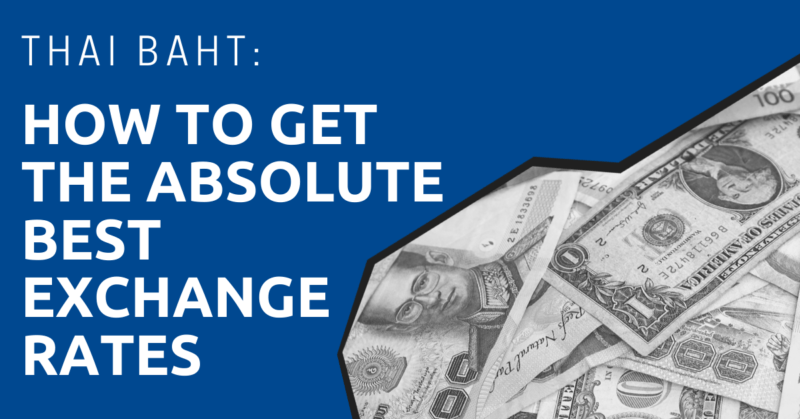
Whether you’re traveling to or living in The Land of Smiles, when it comes to getting the best exchange rate in Thailand, you’re left with a few questions to answer:
- Should I bring money to Thailand?
- Should I withdraw money from an ATM?
- Should I exchange my money at an exchange kiosk or bank?
- Should I use an online transfer service?
The answer to these questions depends on how much money you’re willing to lose in exchange rate fees. But don’t worry, we’ve done all the leg work and have listed not only the best ways to exchange money in Thailand, but how much each method will cost you.
By the end of this guide you’ll know exactly which method will save you the most in exchange rate fees.
If you just want the answer, bringing cash to Thailand gives you the best exchange rate.
But if you don’t want to take that much money with you, you use the below widget to find out which money transfer service is the best option for your case.
"*" indicates required fields
Disclaimer: This article may include links to products or services offered by ExpatDen’s partners, which give us commissions when you click on them. Although this may influence how they appear in the text, we only recommend solutions that we would use in your situation. Read more in our Advertising Disclosure.
Contents
- Key Takeaways
- Is it a Good Idea to Exchange Money in Thailand?
- Declaring Cash at Customs
- Tips for Exchanging Money in Thailand
- How to Read Buy-Sell Exchange Rate Charts
- Exchanging Money in Thailand
- Alternatives to Exchanging Money
- Thailand Exchange Rate Options For US$1,000
- What has been your best method of exchanging money in Thailand?
Key Takeaways
- You get the best rate when bringing cash and exchanging it inside Thailand at a money exchange kiosk such as SuperRich.
- The biggest bank notes of your currency (such as US$100 bills) will get you the best exchange rates.
- You can bring up to US$20,000 (or the equivalent) into Thailand without declaring it.
- Unless you bring USD, GBP, EUR, AUD, and CAD, you might get a better exchange rate by first exchanging your currency to USD.
- Avoid exchanging currency into Thai Baht in your home country or any airports.
- You can withdraw money via ATM. The fee is around US$17 per withdrawal for US$1,000.
- If you have a Thai bank account, use Monito to make an international transfer into Thailand.
Is it a Good Idea to Exchange Money in Thailand?
If you bring currency from the U.S., Europe, Britain, Australia, or Canada into Thailand, you’ll get the most favorable exchange rates.
In fact, bringing cash with you saves you money on ATM and credit card fees, assuming you use a low-cost currency exchange service like SuperRich or the others listed later in this guide.
However, if you’re from another country and have to bring cash into Thailand, it may be a good idea to exchange it into US Dollars (USD) first. Then exchange the dollar to baht once you’re in Thailand.
This works because exchange rates for USD are much better than lesser-used currencies.
The same goes for when you leave Thailand. Exchange your leftover Thai Baht into your home currency while you’re still in Thailand or USD if your home currency has a large buy-sell spread.
Declaring Cash at Customs
According to the Thai Government, you can bring up to US$20,000 (or the equivalent in any other foreign currency) into Thailand without having to declare it with Thai customs officers.
It’s not illegal to bring more than US$20,000, but if you do, you must declare it with a Thai customs officer. Failure to do so is a criminal offense and could lead to legal consequences.
Tips for Exchanging Money in Thailand
This might sound crazy, but the kind of bills you exchange and the condition they’re in could determine how much Thai Baht you get in return.
For instance, larger bills like US$50 notes and US$100 notes will always get you more Thai Baht than smaller notes.
And some money exchange kiosks like SuperRich — who happen to give the best rates — are very particular about which bills they accept. On a recent trip back from South Korea, our editor couldn’t exchange two new 10,000 Korean Won notes into Thai Baht because they had small tears in the corner. So, try to tape or glue any torn notes before you exchange them.
Another option would be to exchange any torn bills at a bank. They usually accept bills in most conditions.
How to Read Buy-Sell Exchange Rate Charts
One of the most confusing things to work out when exchanging money in Thailand is if you’re getting the buying or selling exchange rate.
Knowing this bit of info will help you quickly scan the charts for the best currency exchange rates, especially if you’re in a pinch and need cash at the airport.
When you land in Thailand and are looking for a quick money transfer at the airport, you want to look at the “buy” column on the exchange rates charts. This is, essentially, how much the bank is buying your currency for in Thai Baht.
When you leave Thailand, look at the “sell” column. That’s how much they’re selling your home currency for in exchange for Thai Baht.
Exchanging Money in Thailand
Generally speaking, reputable money exchange kiosks outside of the airport and some banks in Thailand will get you the best currency exchange rates.
Places with the Best Exchange Rates
Listed below are some of the places where you’ll get the best money exchange rates in Thailand.
Money Exchange Kiosks
Money exchange kiosks tend to offer the best deal, bar none, and can save you more than 90 percent on exchange rate fees, effectively costing you as little as 0.06 percent of the transaction amount.
In the table below, you’ll find a comparison of popular money exchange rates by company. Given the small difference in fees, you might want to just go to whichever currency exchange service is closest to you.
| Company | Exchange Fee |
|---|---|
| SuperRich | 0.06% |
| Twelve Victory Exchange Co.,Ltd. | 0.07% |
| MT Exchange | 0.07% |
| Vasu Exchange | 0.10% |
| SIA Exchange | 0.10% |
| Jag Exchange | 0.10% |
| K79 Exchange | 0.17% |
However, of all the money exchange kiosks listed above, SuperRich tends to offer the best rates and remains the most popular place.
In fact, SuperRich has locations all throughout Bangkok nowadays, from inside malls to along BTS skytrain routes.
For the best rates, though, be sure to visit one of its main branches (Google Maps locations in table above). But even the secondary branches still offer better currency exchange rates than most banks in Bangkok.
Just be sure to bring your passport when you want to exchange money at SuperRich. However, some branches may let you use a Thai driver’s license.
Thailand Banks
Bank-owned exchange counters are widely available in tourist areas, from airports to night markets and everywhere in between.
Banks’ exchange rates are in the same region as what most credit card companies charge you for payments or withdrawals in a foreign currency.
The fees aren’t as low as what a debit card gets you for your money, but at least there are no additional fees. Exchanging money at banks is an acceptable option if you only exchange a small amount of money.
If you exchange cash at one of the commercial bank branches that are located throughout Thailand, you’ll pay the rates listed below. Keep in mind that their rates at exchange counters in tourist areas and at airports are higher.
| Bank | Exchange Fee |
|---|---|
| Bangkok Bank | 0.87% |
| Kasikorn Bank | 0.97% |
| Siam Commercial Bank | 1.05% |
So, if you want to exchange US$1,000 at a bank, you’d get the following based on the percentages above.
- Bangkok bank would give you THB32,710
- Kasikorn Bank would give you THB32,680
- Siam Commercial Bank would give you THB32,650
All of these banks get you a better exchange rate than using an ATM machine.
Another option would be to go directly into an official bank branch, give them your debit card, and ask for a cash advance or a cash withdrawal. You’ll have to bring your passport, but some banks won’t charge you any additional fees. So the only fee you’ll pay is the fee your bank charges.
Depending on your bank card, this option may be cheaper than using ATMs. However, don’t do it with a credit card because you’ll be hit with withdrawal and cash advance fees, which will end up costing you even more money.
Places with the Worst Exchange Rates
You may be tempted to exchange your money into Thai Baht before leaving your point of origin, but don’t do it.
Home Country Banks and Airports
Never exchange your money into Thai Baht in your home country. This method is by far the most expensive. In virtually all countries, including countries neighboring Thailand, you tend to lose 5 percent to 10 percent at the very least if you exchange your local currency into baht.
Instead, it’s better to exchange your money once you arrive in Thailand. You’ll get far better rates if you go to SuperRich or one of the other money exchange kiosks mentioned above.
Thailand Airports
You might want to exchange your money as soon as you get to Thailand. However, you should think twice about using the currency exchange kiosks at any of Thailand’s airports.
Even the airport kiosk with the best rates won’t be as favorable as the money exchange kiosks outside of the airports.
That said, there are a few situations where you might need some cash on hand as soon as you land in Thailand. For instance, to buy a SIM card or pay for a taxi.
Read more: Thai SIM Card: Plans, Data, Price, and Registration
Tourist Hubs
Places like Bangkok, Pattaya, and Phuket are teeming with privately owned money exchange kiosks along their main roads. But you should avoid most of these places. You won’t get the best exchange rates here.
Alternatives to Exchanging Money
Whether you need fast cash for an emergency or have no access to money exchange kiosks, you have other ways of getting Thai Baht from your home country’s currency..
ATMs
You can get cash exchanged at decent rates in Thailand by withdrawing large amounts from an ATM.
However, most banks in Thailand charge a THB220 (US$7.00) fee on top of any fees your own bank charges, including fees hidden in inflated exchange rates. This is usually in the range of 0.5 percent to 1 percent per transaction, depending on the bank.
For argument’s sake, let’s say the current exchange rate from USD to THB is 1 to 33.
Without any fees, and in an ideal world, you’d get THB33,000 for a US$1,000 currency exchange.
That means if you want to take out US$1,000 from an ATM in Thailand, using a 1 percent exchange rate fee as an example, you’d only get THB32,670.
Add the THB220 withdrawal fee and you’re left with THB32,450. This isn’t including any fees your home bank charges.
This means you’ve spent almost US$17 on ATM fees to withdraw US$1,000. You’ve just lost 1.7 percent of your money.
Is losing that much money the end of the world? Not really. Especially in the event of an emergency. But when you live in Thailand and find out that the US$17 you’ve just spent on ATM fees could’ve paid your internet or Thai cell phone bill for the month, it adds a new perspective.
Read more: The Complete Guide to ATMs in Thailand
Credit Cards
If you decide to use a Thai credit card to purchase something instead of withdrawing the money from an ATM, you’ll pay even more in exchange rate fees, typically between 2 percent and 2.5 percent.
Using our US$1,000 example from above, that means you’d pay THB33,825 for something that costs THB33,000, or an extra US$25. And then you’d have to tack on the interest your credit card company charges you for not paying the balance in full (if you don’t pay it in full each month).
Over the last few years, businesses and even some ATMs have started offering to charge customers in their credit card’s currency instead of Thai Baht. This could result in an exchange rate of 5 percent fee or more than that of your credit card company, which is usually less than 2.5 percent.
How to Avoid Credit Card Fees in Thailand
Some of the best deals, savings, and alternatives to hotels are available only online. If you pay for these deals in your home currency by credit card before you come to Thailand, you’ll instantly save on the booking price, and it’ll be less money you have to exchange in Thailand and possibly less money to lose.
Online International Money Transfers
You usually get the best exchange rates when exchanging your money inside of Thailand.
But if you don’t want to travel with cash and have a Thai bank account — or know someone who does — you can use Monito to compare different online transfer services and find out which one offers the best currency exchange rates.
Usually, of all the online money transfer service providers, Wise offers the best mid-market exchange rates and minimal transfer fees, roughly US$10 for every US$1,000 transferred.
Thailand Exchange Rate Options For US$1,000
If you think about it, getting the best exchange rate in Thailand comes down not to how much you’re going to get in the end, but how much you’re willing to part with in the beginning.
Just to recap, here’s how much money it’ll cost you to exchange US$1,000 into Thai Baht using all the methods in this guide.
| Method | Cost |
|---|---|
| Exchange Kiosk (best choice) | $6.06+ |
| Bank (best choice) | $8.80+ |
| Online Money Transfer | $7.42 |
| ATM | $17+ |
What has been your best method of exchanging money in Thailand?
If you’ve ever exchanged money in Thailand using a method we didn’t outline above, let us know in the comments section. We’d love to hear about it.




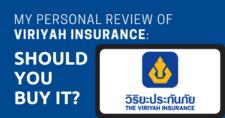
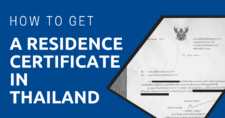
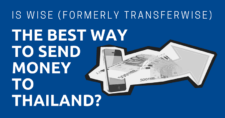
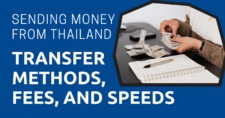
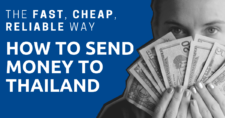

Do you happen to know if the Test and Go Covid protocols with Thailand Pass will allow exchanging money at the Airport before being transported to the hotel? We are required to meet the prearranged transport arranged by the hotel and BPK9 International Hospital. We meet them at Exit. C (Gate 8-10).
For large amounts you can walk into Bangkok Bank and do the exchange with the Bank staff and there is no 220 baht fee. I discovered this when I needed more than my ATM daily limit which was around 25000 baht.
“However, most banks in Thailand charge a 220 baht ($7.00 US) fee on top of any fees your own bank charges, including fees hidden in inflated exchange rates, usually in the range of 0.5% to 1% per transaction, depending on your bank.”
Just went to Kasikorn bank ATM (in Pattaya). I withdrew (using my Australian Visa card) 20,000 Baht (~us$600). It charged me 220 baht ACCESS FEE …AND… 5.50% (YES 5.50%) EXCH. RATE MARK-UP. So all together to get 20,000 baht they charged me 1,320 baht. I call it ROBBERY by Thai bank. Watch v.closely what it displays on the ATM screen!!. Better (much better) change your cash (us$ or whatever currency) at Money Changer (TT Currency Exchange probably best).
It sounds like you selected to have Kasikorn Bank do the conversion from THB to AUD when you withdrew your funds. The usual rate is 0.5 – 1%, assuming you are not selecting the option to have the Thai bank do the conversion. Point-of-Sale (or withdrawal) currency conversions are always worse than what your bank at home would use to calculate the conversion. If you opt for deduction of your account in THB, your Australian bank will do the conversion and you most likely end up paying not more than 1% if it’s a debit card (credit cards may have higher fees).
Coming from South Africa -Rand ZAR. Is it better to exchange to dollars and taking it over? Or better taking rands (ZAR) over ?
Not sure what kind of rates you get when withdrawing from an ATM in Thailand with a debit card.
I suspect you’ll get the best rate by finding a really competitive ZAR-USD exchange in South Africa and then exchanging the USD to THB in Thailand (e.g. at SuperRich at the airport next to the subway entrance).
I and others have addressed this before. Bring your currency to Thailand and exchange it there. Do not pay extra to convert twice.
Depends on the currency.
15,000.00 ZAR gets you 29,850.00 THB in Thailand at the best rate today.
If you bring the same amount (15k ZAR) in USD, you’ll get 31,497.39 THB in Thailand at the best rate. That’s nearly 5% more.
The question is, how much does it cost you to convert it to USD first. If there is a competitive rate for ZAR to USD in South Africa (pretty likely, there is a lot of close to interbank rate exchanges), you’re much better off exchanging it in USD first and then exchanging the USD to THB in Thailand.
It’s better to pay 0.10% twice, than to pay 4% once.
Hi I’m currently in Thailand and unfortunately didn’t see this thread before. I have a debit card with starling. From reading I see it’s best to go to an exchange in the city of Bangkok where I’m currently staying. Only problem is super rich don’t take debit card. Are all exchanges the same? I know I can go to a bank and exchange but I wanted the vest rate possible. What would you suggest?
You could walk into a Bangkok Bank branch and ask them to do a withdrawal directly from your debit card. I heard this may work without a fixed ATM fee and at least you’d get Bangkok Bank’s rate which tends to be better than all the other banks. Considering the amounts you mentioned and the fact you’re already here, that might be the cheapest feasible option. Alternatively go to a Bangkok Bank ATM which will incur about THB 150 to 200 in fees I believe. Specifics may also depend on your home bank.
we will be in Thailand shortly and wife wants to bring some thai base back to uk.
she thinks buying dollar in Thailand and then changing to gbp gives better results i think she will lose, advice appreciated.
Heading to Thailand in a month… was planning to change £1000. However, reading this article I may be best changing it there?
But… is it safe to carry £1000 cash? should I take the cash or withdraw from a bank? I’m a bit lost..
Take it in cash and exchange it at the airport at one of the exchange shops right in front of the Subway station entrance. Good rates, not much risk.
Hello,
I am going to thailand next month and am getting surgery that will be 16,900 thai baht which is about $553.08 USD how much will I have to pay to get 16,900 thai baht? What is the exchange rate? this is kind of confusing it’s my first time going to thailand.
Thanks
It should be around $550 USD to $570 USD for 16,900 baht.
Hi , I am travelling to Thailand for work from India and is it better if I load my Forex card with Thai bhat and use it at ATM , since I will be withdrawing a large amount of Thai bhat to sustain life for one month till I get my pay check
Depends on the specific fees and conditions of your card. What exchange rate do you get for INR to USD? Might be the cheapest option to bring USD in cash.
I cannot speak for all currencies but certainly do not exchange Canadian or Australian dollars into US dollars either just buy Thai Baht directly in Thailand. Check the sites given earlier in this thread to see if your currency is one that should be exchanged into US$ first as likely it is not.
Thanks, will update that accordingly.
Well, by exchanging my euros to dollars at home I’d already lose 19$ per 1000$. This is an extremely stupid suggestion.
You’re right in that it doesn’t make sense with EUR or GBP as the on-site exchange rates for those are really good in Thailand. However, for the majority of currencies in the world, exchanging into USD first makes sense, assuming you want to bring cash.
I’ve clarified the article accordingly.
i am going back to my country and i need to change the THB to USD, which one would be better: Bank or at Airport.
Thank you
Exchange service like Super Rich, Victory 12 etc. offer better rates than banks. Even their branches at the airport (downstairs, next to the MRT) have really good rates.
Thank you
Doing operation in thiland hospital and its about 530000 baht
Do I bring dollar or baht
Please advise
Hi Saif. Sounds like a lot of money to be walking around with. That’s about $16,000USD. Do you really want to travel with that much cash? I’d ask the hospital if you can pay by US credit card or make an international transfer.
I always use daytodaydata werbsite or thailandexchanges.com for accurate rates , prefer last one as it has a lot more exchanges listed
I certainly wouldn’t dream of exchanging my currency into Dollars first, that would just be a complete waste of my money! I’d lose more doing so. It may work with some currencies, but not going from Pounds Sterling into Thai Baht!
I am traveling this week want to understand if I should carry dollars or baht from India. Or should convert dollars into baht in Thailand . Pls reply asap. Thanks in advance.
Carry US Dollars and exchange them at Superrich. There’s a Supperrich in Suvarnabhumi Airport.
Okay thanks
So I normally use my credit cards when i travel abroad no fees but im a bit freaked out by the comments on the internet saying i might have to show immigration like 20,000 baht 600-700 usd per person. So i plan on bringing cash instead and just exchanging what i need in Thailand. This was super helpful in my finding an exchange near my hotel. Have you heard any information on the cash requirement for entering?
Your percentages for exchange fees are wrong, it’s 0,6% for Super Rich & so on, not 0,06%.
The percentages are correct: The rates are virtually mid-market rates. I know how mind-boggling that sounds when you compare it with banks (where you usually find 0.5% if it’s a very good rate), but that is indeed the situation on the ground at the major branches of those cash currency exchanges. Even at the airport, once you get to the subway area, you get rates that are close to that range. It makes cash exchanges by far the cheapest option.
Hey Karsten,
Thanks for the blog (y) It cleared many questions i have on conversion rates in thailand.
Very informative and realistic blog.
I’ve been going to Thailand a couple times a year from the U.S. I found that if you exchange your usd to baht before you travel, you get the best rates. Of course look around first. AAA ( American Automobile Association) has the EXACT rates of that day. There is a $3 USD flat fee charge on any amount you want to exchange.
When I went to Thailand, the airport kioks are 3 baht 4 baht lower. Multiple that by how much you exchange and that’s alot in Thai currency. Even the banks there have the lowest rates plus up to 7% fee.
Let’s say I want to exchange $550 USD for Bhat.
Rate at AAA is 32.96 bhat to 1usd at the time of exchange.
That is 18,128 baht.
The rate at the kioks range from 29 baht to 30 baht. Plus their fee ( 150 baht to 200 baht)
That’s 15,950 bhat to 16,500 baht plus the fees.
The banks aren’t any better….
Losing 1500 to 2000 baht as soon as you get off the plane doesn’t bother you, then bring your cash to exchange there. But you’ll realize that 1500 to 2000 baht is alot to lose that fast if you are a thai national. It goes a long long way.
Or, just get a thai bank account or transfer money into a friends thai account before you travel there.
This comment is primarily for U.S. travelers.
I found this information when I had to get a IDP (International Driver’s Permit) to drive in Thailand. AAA is the best at giving you best rates as the market shows for that day. It locks in and takes 2 to 3 days for the currency to arrive at your AAA location.
Your IDP is $20 usd.
I don’t work for AAA. I didn’t even know they did currency exchange, IDP and other travel stuff.
At least check them out http://www.aaa.com
Happy travels!!!!
I have forex card .will it be useful in bangkok for shopping. Rest hotel, food is already paid in tours.
Hey Karsten,
Good, informative post, thanks for this. Would be great to know some tips for transferring money out of Thailand, as I make my salary here and have certain bills (student loan, credit card) to pay back home (Norway).
I’ve mailed Transferwise and used their request option (if you read this and want the same, please go to the Transferwise page and do the same!), but so far no luck! Seems limited to transferring via local banks (high fees) or services like Western Union (also high fees)?
Hi I am from Philippines and I have 3 days tour in Bangkok this coming december, what would be the best way of money exchange? Appreciate your reply.. thanks a lot.
Bringing cash to Thailand and exchanging it in the country is a surprisingly effective way to handle things – assuming you exchange it at the right place. A number of places provide reasonably competitive rates, but there are some that are out-of-this-world good.
What are the right places re you talking about? Can you help me on that??
Hi..i want to start money exchange..how i can get licence for money exchange?
I’m not sure about the regulatory requirements for that. What steps have you taken so far and did you find out anything about the process already?
Hi there , we are travelling to Thailand next week from Australia , do we also have to convert to US dollar for better rates or not bother?
Caroline H
Hi there I’m traveling to Thailand at end of January 2018, an will have about £4500 that I want to change into Thai baht, should I just leave it in sterling then change into TBH or would it be better for me to change into USD in England first, then change that into THB once I’m in Thailand, an use a money exchange office rather than bank, thanks
I’d say bring GBP – you’ll get pretty competitive rates for those and cash exchange rates in the UK (even for USD) will be awful
Hello, Can I bring British Pounds and convert them to Thai Baths in Thailand or is it still better to bring USD which means I would have to buy USD first and then THB?
Thank you
I’d say with British Pounds, I’d just bring that. Exchanging cash in the UK would probably have a steep surcharge.
I have been told that exchange counters in Thailand do not recognize canadian currency. The exchange rate here for US currency is just under $0.80. I have heard that exchanging money into USD here and then converting to THB once in Thailand is the best option. What are your views on this? Also, I have a USD bank account, could that assist me with getting money exchanged easier once in Thailand? Any help or advice would be greatly appreciated!!!
Normally, exchanging through a money exchange counter gives a better rate then though a bank account. In your case, you can compare between exchanging from CAD to USD (from Canada) and then USD to THB and exchanging from CAD to USD directly. The exchange rate can be found on [link temporarily removed due to their website being hacked]
DO NOT CLICK ON THE LINK ABOVE!!
It will try to install “JSCoinminer Download 6,” which is harmful to your computer.
JScoinminer is a detection for a JavaScript cryptocurrency miner that runs in web browsers. The javascript coin miner consumes enormous CPU resources, making computer use sluggish. The JavaScript is loaded in the browser when the user visits a web page hosting the JavaScript. The JavaScript runs as long as the user stays on the web page. As long as the website being visited is injected with the coin mining javascript, the website will be blocked by this signature. The computer system is not actually “infected” when this detection triggers.
Thanks, Fred. I’ve edited the comment. Not too great for a financial services company if their website gets hacked, but yeah, tech-wise there are some improvement opportunities for companies here.
Hi, Do Money Exchange Offices such as Super Rich accept U.S. bank debit cards?
Thanks.
Banks do, but I doubt Super Rich does. If you try it out, please let me know how it goes.
I live in Canada, does it still make sense to convert to USD and then convert that into THB in Thailand? Or is it better to take CDN dollars and convert them into THB in Thailand.
Also I’ve been told the best place to convert is at the Thailand airport, is this true? if not where is the best place for Canadians?
Depends a little on the exchange rate you get for CDN to USD in Canada. Unless it’s a large amount, you might not want to bother. Airport rates at the exchange shops near the subway at the airport are indeed very good (not the best, but not worth going elsewhere for better rates) – e.g. the SuperRich branches there. Important to note is that it’s only those shops – the other counters by banks found throughout the airport have worse rates.
I do not change Canadian into US before going to Thailand. In fact I’ll get more by exchanging Cdn to Baht and then to US at Vasu near Suhkumvit 7 than I would get buying US in Canada. Check their rates at http://www.vasuexchange.com . What is shown is the rate for $100, you’ll get a worse rate if you use smaller bills.They usually give best or second best rates in Bangkok according to daytodaydata.net at least for Canadian dollars.
So is it better to go to TD bank and exchange USD in America or bring American money to Thailand?
If you plan to expand cash, it’s always better to bring USD and do it within Thailand.
Hi Karsten, very good and useful update.
For me it is quite convenient as I have Thai friends who currently work in Singapore. They need to send money back so i help them with it and they send money to my Singapore account. Of course there are trust issues with friends and money, but thankfully all has been good so far.
Hello Karsten, thanks for linking to me.
Unfortunately Citibank now charges the 200 THB as well. But it still allows withdrawal of high amounts of Thai Baht.
Best regards, Charles
Thanks a lot Charles – edited the article accordingly!
Another great and informative post – cheers Karsten